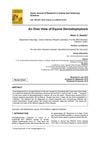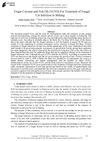
Interest in COVID-19 hair loss increased during COVID-19 surges, especially in higher-income countries.
 November 2021 in “Folia Microbiologica”
November 2021 in “Folia Microbiologica” Trichophyton bullosum has been found causing severe skin infections in donkeys in North Africa for the first time since 1933.
 October 2019 in “Asian Journal of Research in Animal and Veterinary Sciences”
October 2019 in “Asian Journal of Research in Animal and Veterinary Sciences” Young horses are more prone to a fungal infection causing hair loss and skin redness.

The document is a detailed guide on skin conditions and treatments for dermatologists.
 June 2018 in “Journal of Acupuncture and Meridian Studies”
June 2018 in “Journal of Acupuncture and Meridian Studies” New technologies in acupuncture and biosensors show promise for better medical treatments and healing.

Combining microneedling with platelet-rich plasma enhances skin repair and collagen production but may not offer significant extra benefits.

VCFO effectively treats fungal infections in cats and promotes hair regrowth.
 March 2012 in “Journal of The American Academy of Dermatology”
March 2012 in “Journal of The American Academy of Dermatology” 
Use the least toxic, most specific treatments for skin diseases, considering side effects and individual patient needs.
 December 2008 in “Enzyme and Microbial Technology”
December 2008 in “Enzyme and Microbial Technology” New patents include innovations in skin and hair care, disease treatment, plant stress tolerance, and protein purification.
 June 2001 in “Annals of Internal Medicine”
June 2001 in “Annals of Internal Medicine” The conclusion suggests that the zinc lozenge study is valid despite imperfect blinding, as many participants could not correctly identify their lozenge type.
 September 1997 in “JEADV. Journal of the European Academy of Dermatology and Venereology/Journal of the European Academy of Dermatology and Venereology”
September 1997 in “JEADV. Journal of the European Academy of Dermatology and Venereology/Journal of the European Academy of Dermatology and Venereology” The document concludes that treatments like oral anti-androgens, minoxidil, and topical spironolactone can be effective for hair loss in men and women.
 February 1938 in “Journal of the American Medical Association”
February 1938 in “Journal of the American Medical Association” Washing can prevent cancer from lubricating oils, extreme body temperatures need more study, Sulfomid is not recognized, no reliable diphtheria carrier treatment except surgery, eyelid injuries should heal before repair, heterophile antibody test is specific for mononucleosis, chlorine inhalations for colds are outdated, and wheat germ is safe.
3 citations,
February 2014 in “Anadolu psikiyatri dergisi” A teenager's hair loss was caused by the drug quetiapine but improved after stopping the medication.
 2 citations,
August 2022 in “JAAD case reports”
2 citations,
August 2022 in “JAAD case reports” COVID-19 vaccines may rarely worsen hair loss in people with severe alopecia, but the benefits of vaccination still outweigh this risk.
August 2021 in “Journal of cosmetic dermatology” The editorial stresses the importance of COVID-19 vaccination and ongoing contributions to the journal.
21 citations,
May 2019 in “Pediatrics in review” People with primary immunodeficiencies often have frequent, severe, or unusual infections and may need special tests and management strategies.

The document concluded that certain compounds might strongly bind to and potentially inhibit a key SARS-CoV-2 protein, but further testing is needed.
4 citations,
June 2022 in “Journal of food bioactives” Eating plant-based anti-inflammatories and antioxidants may help manage long-term COVID-19 health issues.
 1 citations,
August 2022 in “JAAD Case Reports”
1 citations,
August 2022 in “JAAD Case Reports” A woman's complete hair loss condition improved after recovering from COVID-19.
1 citations,
January 2017 in “Ancient science of life/Ancient Science of Life” Vatika Enriched Coconut Hair Oil is safe and more effective than regular coconut oil for reducing hair fall and dandruff.
1 citations,
August 1998 in “Pediatrics in review” Understanding cultural practices and skin reactions is crucial for diagnosing and treating skin conditions in children with dark skin.
 August 2024 in “Journal of Dermatology for Physician Assistants”
August 2024 in “Journal of Dermatology for Physician Assistants” Early treatment of COVID-19-related hair loss is crucial for better outcomes.

Hepatitis B vaccination can trigger HSP, and vitamin D correction and tonsillectomy can effectively manage it.
 August 2023 in “Journal of Student Research”
August 2023 in “Journal of Student Research” The document concludes that alopecia is an incurable autoimmune disease with various treatments and that diet, as well as COVID-19, may impact it.

COVID-19 infection is highly related to increased hair loss, especially in women.
 May 2023 in “Journal of The American Academy of Dermatology”
May 2023 in “Journal of The American Academy of Dermatology” Most lab tests for patients with Telogen effluvium, a type of hair loss, show no or mild abnormalities; only a few specific tests are useful.
 April 2023 in “Indian journal of paediatric dermatology”
April 2023 in “Indian journal of paediatric dermatology” Early diagnosis and treatment of nail lichen planus in children can prevent permanent nail damage.

Antiandrogens might help prevent or treat COVID-19 by blocking the virus's entry into cells.
 September 2022 in “JAAD Case Reports”
September 2022 in “JAAD Case Reports” COVID-19 may worsen hair loss in people with a certain type of scarring alopecia, but early treatment can help improve symptoms and hair regrowth.
























